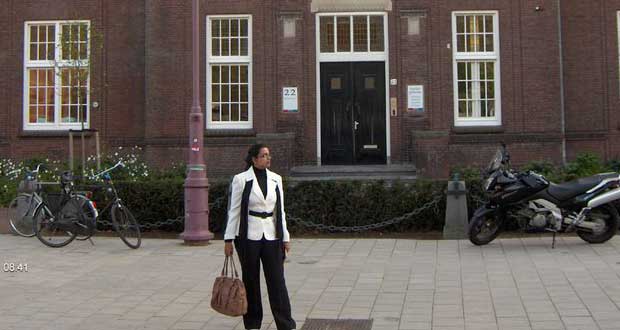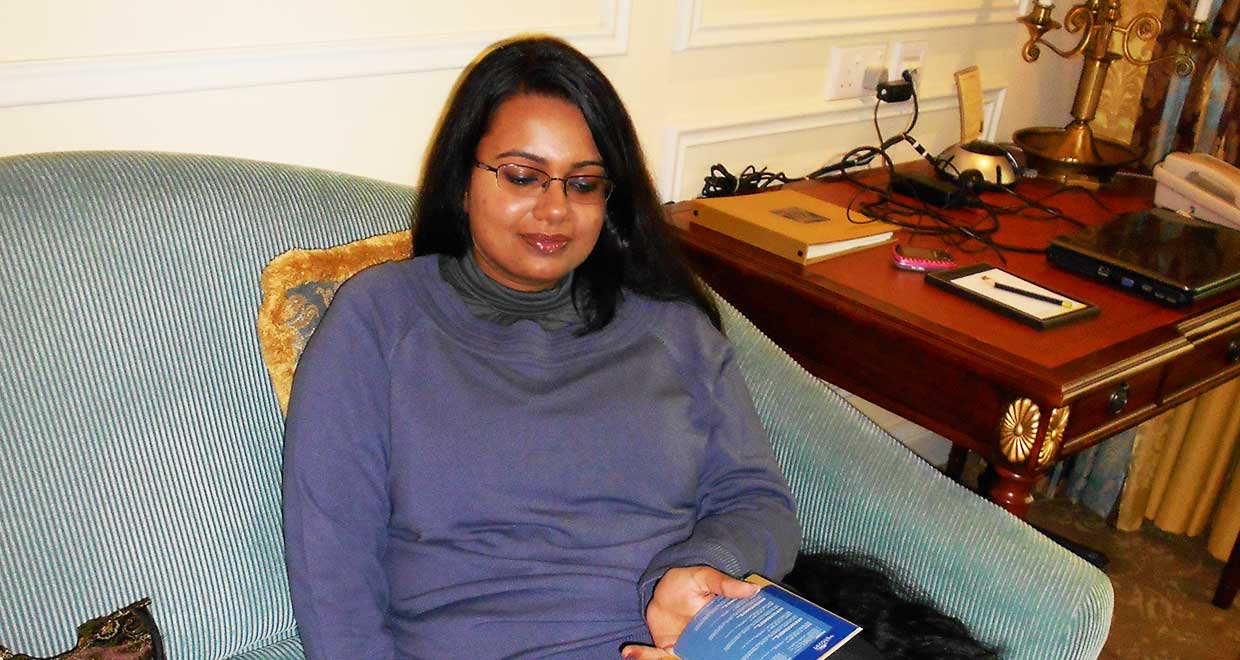Jayantika Ganguly graduated from WB National University of Juridical Sciences, Kolkata, back in 2008. She has thereafter worked at Amarchand & Mangaldas & Suresh A Shroff & Co (“AMSS”) for more than three years, and is currently working as a Senior Associate at Khaitan & Co. (“KCo”).
We asked her to share her journey from being a law student to being a corporate lawyer.
Given that most of our readers are law students and young lawyers, how will you introduce yourself to them?
“Hello, Lawdroids! Greetings from a sample of Lawdroid Ice-cream Sandwich!”
<Disclaimer: I do not own the terms “Lawdroids” or “Ice-cream Sandwich” and these are merely being used for representative purposes.>
Back in 2003, NUJS was a fairly new institute. What motivated you to choose law as a career?
It might sound a tad fickle, but law was simply the most interesting option for me at that stage. Law was exciting and a heady blend of the secure and intrepid – which just felt right.Perhaps a side-effect of growing up on detective stories!
NUJS was fairly new back then (we were the fourth batch) – but we had the legendary Dr Madhava Menon as the Vice Chancellor! The rank #3 in the entrance exam helped, too.
In retrospect how would you compare NUJS with other premier law institutions of the country?
NUJS is undoubtedly one of the best. As an alumnus, my hindsight might be a little more rose-tinted than reality – but NUJS did a great job of not only training us in law, but also preparing us for our professional lives. The courses, internships, projects, moots, extra-curricular activities – it was all great. I think NUJS might have one of the most active student populations amongst the law schools. It certainly gave us a twinkle in our eye and a swagger in our stride.
How did your recruitment at AMSS take place? How do you recall your anticipation of the job offer?
Campus recruitment – our Placement Committee did a spectacular job. The procedure was fairly standard – CVs were sent, shortlisted students were called in for a Group Discussion, and further selected students were called in for individual interviews. I remember frantically reading the Companies Act before the scheduled date – but in the end, it wasn’t required. We were tested for our aptitude, oratory and analytical skills.
Many lawyers would say that the actual learning takes place in the years of practice. How far would you say it is true? What was the case in your situation?
I would take that statement with a grain of salt – but then, this is my personal opinion. I feel the internships and the way they are structured in law schools are very advantageous and we are not caught unawares upon joining a firm/company. You study a subject, and then you get to apply your knowledge during your summer internship. I certainly learnt a lot this way. Obviously we do not learn everything in college and during internships – but we definitely gain a general idea of how things function, and that is what ultimately influences the decision on where to work.
You worked at AMSS for more than three years before joining KCo. Being the largest law firm in India, how did it shape up your work profile?
At AMSS, I worked in the Project Finance team. Headline-grabbing deals and late nights were the norm. It was a fantastic learning experience – fast and glamorous.
After having worked at AMSS for more than 3 years how did the shift to KCo take place?
The move to Kolkata, for family reasons, was the operative factor. By a happy coincidence, KCo Kolkata was looking to recruit and I got lucky!
What does your current work profile at KCo consist of? How is a typical workday like?
At KCo, I am a part of the Corporate Team, so I get to work on a wider range of transactions here. A typical work day would have a few phone calls, a meeting or two thrown in, some discussion sessions and a lot of emails, document review and drafting.

It’s been six years of your work experience in corporate law. What would you say contributes to the high attrition rate of the top law firms?
There are a fair number of reasons. A lot of lawyers wish to work for a few years before going in for their Masters degree. Some move either out of a desire for change or for personal reasons. In my opinion, though, the biggest culprits behind high attrition rates are burnouts and breakdowns. The frantic pace and glory of big deals feels amazing at the beginning – but gradually, it gets exhausting. Health problems start cropping up – and that is when most people leave. Some are able to adapt, some are able to change their lifestyle and continue. This is more common with first jobs, I think, because as students, we are unable to accurately gauge what we are getting into – we are too star-struck. Also, the elation of the first all-nighter, the euphoria of a successful closing, the excitement of seeing your deal in a newspaper, the feeling of being ‘important’ – these are all quite addictive, so, more often than not, we tend to ignore our health concerns until something goes seriously wrong.
In these six years you must have guided a lot of interns at AMSS and KCo. What do you think differentiates a good intern from the rest? How can an intern make a positive impression in the limited time they have?
The best interns I have seen are prompt and meticulous. The characteristics of a good intern are pretty much the same as the characteristics of a good associate. Take your deadlines seriously. If you don’t have the bandwidth to take on additional assignments, say it upfront and request an extended deadline if possible – if not, check with the senior for priorities. Listen to instructions carefully – ask questions if you do not understand. Be meticulous. No one will penalise an intern for not knowing an obscure detail of law – but silly mistakes, shoddy submissions are not good. Do your research well and be prepared to answer questions on the assignment you have been given.
Life for lawfirmites can be very hectic at times. What is your take on work-life balance? How do you unwind?
Work-life balance is very important to me. I think it is a somewhat misunderstood concept. Work-life balance does not mean that you leave your time-sensitive transaction hanging and wander off because your work-hours are over – that is simple irresponsibility. What it means is that you do your work to the best of your ability, but you also keep some time to yourself, indulge in something you are passionate about, and you also keep an eye on your wellbeing. It is about finding a passion beyond your work and making time for it. It will have a positive effect on your work efficiency as well, as you will be more organised and work down the priority list.
There are plenty of unwinding activities I indulge in. I love travelling – be it for work or leisure – and I try to travel as much as I can. I also fancy (or, perhaps, delude) myself to be a bit of a writer. I like to explore new cuisines and new languages. I am an avid Sherlockian as well – and a fan of music, art, dance and drama.
Many young law students want to have a flourishing career in corporate law. What would be your advice to the future corporate lawyers?
Other than thoroughly studying the corporate laws, keep abreast of the market news. Being up-to-date on information as well as laws is important. Try and intern with companies as well as law firms – this will give you a well-rounded idea about how things work on both sides. Hone your drafting and negotiation skills – this will form a major chunk of your work hours.
























